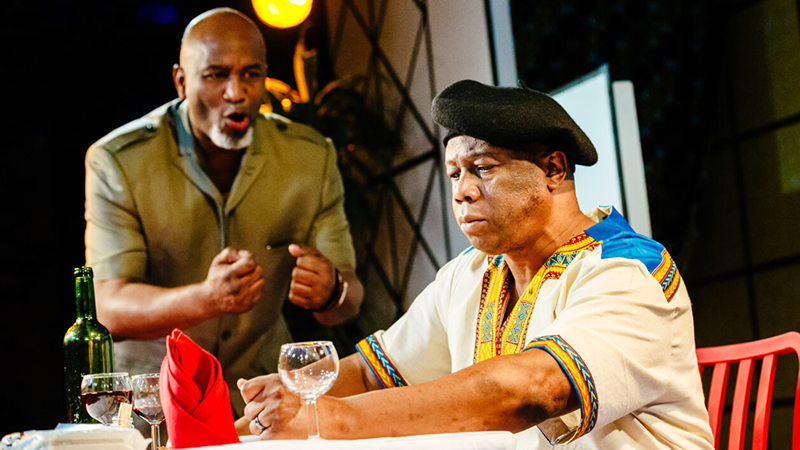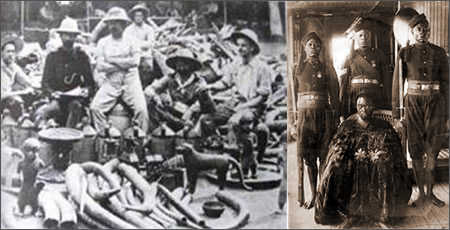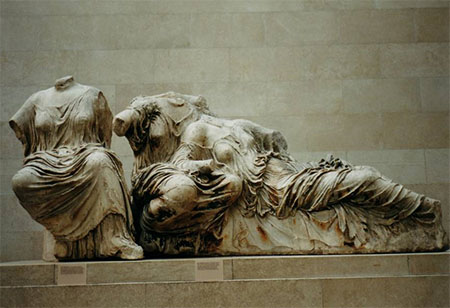This British produced movie is hailed in some quarters as an essential teaching tool for the general public as it enables the descendants and leaders of the world’s largest slaving nation to congratulate themselves for 'abolishing' a crime they themselves internationalised. Shamefully, whilst they will be celebrating the passing of a 200 year parliamentary Act in 2007, they will also continue to profit from economic exploitation of millions of African people.
Principal Cast: Ioan Gruffudd, Romola Garai, Ciaran Hinds, Rufus Sewell, Benedict Cumberbatch, Youssou N'Dour, with Michael Gambon, Albert Finney

Anyone who intends to watch this film to learn something more about human rights abuses, institutional racism, church immorality, royal complicity, savage brutality, forced labour and the millions of African lives that were subjugated, demeaned and lost because of British slavery will be in for a major disappointment. There is little focus on the injustice of Britain's crimes against African people, nor is there any deep expose of the exploitative British institutions at the heart of the Maafa. In a position that echoes the extensive British media coverage of the enslavement of African people, the film relegates this unprecedented system of human rights abuse to a mere footnote indiscretion. Supporters of the Church, Monarchy and British government can rest easy knowing that the bulk of the sins are passed on to a handful of the business class implicating only a few but exonerating the majority of the gentry and politicians of the day.
The movie feigns a benign picture of British society, introducing William Wilberforce as a principled member of the House of Commons with a penchant for assisting injured animals and hungry beggars not to mention a singing voice of great standing. His much talked about conversion to evangelical Christianity is portrayed in a nauseating scene, reminiscent of the most overindulgent fairytale, in which Wilberforce is shown lying on his back in a field pondering over the natural wonder of a spider.
The film fails to focus on the fact that he was the son of a rich merchant preferring to highlight his relationship with John Newton, the former slaver turned Christian convert, preacher and author of the hymn Amazing Grace.
Once Wilberforce's friend, Prime Minister William Pitt recruits Wilberforce to front the abolition agenda the pair engage in a series of meetings and tedious tea parties at various country estates. The incredibly wearisome scenes in the House of Commons prove themselves to be anything but representative of the common people of Britain with the forged passions of the British parliamentarians of the day uncannily resembling the disingenuous Punch and Judy antics of British politicians today, two centuries later.
Typically, as with many apparently liberalist agenda productions of this ilk, African people are denied a voice unless it is presented through the mouth or actions of a ‘sympathetic’ european hero. In an early character establishing scene, the young Wilberforce is gambling with the Duke of Clarence, a member of the royal family, who after running out of cash utters "bring me my n****r” and proceeds to offer the enslaved African as collateral. Wilberforce in a flamboyant act of moral virtuousness storms out seemingly 'offended'. Hence, the Tarzan syndrome is unleashed.
The inclusion of the African British abolitionist, Olaudah Equiano, played by Senegalses singer, Youssou N’Dour does little to improve the plot, balance or factual accuracy of the film as he is limited to no more than ten lines throughout the entire film. Unsurprisingly, the film does not re-enact how Wilberforce in 1816, chaired a public dinner at Freemasons' Tavern for something called the African and Asiatic Society and forced the handful of Africans and Asians present to remain at the other end of the room, behind a screen so as not offend their British sensibilities.
The startling absence of African people in the film is not the only casualty of this revisionist telling of history. The instigating role of the Quakers is excluded and the reputation of committed abolitionists such as Thomas Clarkson who actually worked to obtain the petition signatures Wilberforce dramatically presents to the House of Commons is marginalised. The determining impact of relentless African resistance, including the revolutionary uprisings in Haiti is also relegated to a ten second footnote.
Again, it serves as no great surprise that there is little reference to Wilberforce's opium addiction, his opposition to the abolition of slavery itself, his belief that women should not be able to vote, his support for the whipping of enslaved Africans and his racist anti-African beliefs that African people whilst in possession of a soul, were sub human and in need of 'training' in order to become "a grateful peasantry". Small wonder then, that he is hailed by politicians, journalists and individuals alike as a beacon of British values and attitudes.
Some historians claim that Wilberforce campaigned tirelessly against slavery, the filmmakers knowing this to be untrue craftily utilise the plot device of flashbacks to skip the many years when he lost total interest and focused on trivial issues such as imposing his desire for legislation to force the common people of Britain to behave with gentile manners. There is no mention of how, as the head of the Society for the Suppression of Vice, Wilberforce opposed stage dancers and ballad singers, nor does the film expose how he believed in the suppression of those who wrote "Liberty and Equality" on walls and was in favour of imprisonment for adultery. The film conveniently forgets that Wilberforce extended William Pitt’s 1799 Combination Act which prevented the workers of England from forming unions to facilitate them reducing their working hours or calling for pay increases. Writing on the issue, Wilberforce suggests that those in poverty simply console themselves with the thought that life is "very short."
The movie’s determined intention to promote Wilberforce's 'humanitarianism' chose not to explain the real strategic and economic reasons why Britain was willing to pass an earlier Act in 1806 banning 'trade' with its foreign rivals. Instead, the film presents the Bill as an abolitionist strategy to 'trick' Parliament into furthering the war effort against France.
The film focuses on the much lauded bicentenary marker of 1807 thereby totally ignoring the masses of the African uprisings before and after the passing of the Act. The revolutionary actions of Africans in the Caribbean, the Americas and onboard slaving vessels leading to the large loss of British lives is swept under the proverbial carpet to facilitate an insipid love story which is then used to further extol Wilberforce’s mythical passion for abolition.
It is rumoured that the makers of Amazing Grace were given a copy of Adam Hochschild's book, Bury the Chains but rejected it in anger when they found the truths it told incompatible with their revisionist agenda.
Ioan Gruffudd, the actor who plays Wilberforce in Michael Apted's £15 million film has said; "I was sort of ignorant of the story myself… Coming from the United Kingdom, I wasn't aware that William Wilberforce had abolished the 'slave trade' 26 years before the abolition of slavery."
Amazing Grace has been heavily marketed to and endorsed by evangelical Christian groups. As a result, one of the main groups of people who have enjoyed this propaganda without challenging any of its historical inaccuracies is Christians. In America, more than 5,500 churches are reported to have taken part in "Amazing Grace Sunday" to celebrate the film. For many African people, including those who are committed Christians, the churches complicity in the perpetuation of lies is anti-African, anti-Christian and anti-social. The inability of the Christians involved in making this film to redress the imbalance in the historical retelling of the enslavement highlights the church’s failure to progress beyond the compromised morality that promotes the idea that African people are subhuman, insignificant and ultimately in need of Christian salvation.
This movie enables the movie makers to find a hero from an institution which was complicit in the Maafa from enslavement to colonisation. Simultaneously anglo-american audiences who seek to congratulate themselves for 'abolition' whilst absolving themselves from the guilt of the continued benefit from the oppression, exploitation and unresolved crimes committed against Mama Africa can now comfortably do so. On an interesting and ironic note, the overt propagation of falsities in the movie aimed at presenting the european as the ultimate hero in the story of enslavement has succeeded in encouraging some Africans who are Christians to stop singing the hymn 'Amazing Grace' out of respect for their own enslaved ancestors and the reputed hundreds of Africans who brutally died whilst subjugated by the hymns author, John Newton during the downplayed ‘middle passage’.

External Links
Counterpunch – An amazing disgraceTruth 2007: Exploring the Wilberforce myths
Principal Cast: Ioan Gruffudd, Romola Garai, Ciaran Hinds, Rufus Sewell, Benedict Cumberbatch, Youssou N'Dour, with Michael Gambon, Albert Finney

The movie feigns a benign picture of British society, introducing William Wilberforce as a principled member of the House of Commons with a penchant for assisting injured animals and hungry beggars not to mention a singing voice of great standing. His much talked about conversion to evangelical Christianity is portrayed in a nauseating scene, reminiscent of the most overindulgent fairytale, in which Wilberforce is shown lying on his back in a field pondering over the natural wonder of a spider.
The film fails to focus on the fact that he was the son of a rich merchant preferring to highlight his relationship with John Newton, the former slaver turned Christian convert, preacher and author of the hymn Amazing Grace.
Once Wilberforce's friend, Prime Minister William Pitt recruits Wilberforce to front the abolition agenda the pair engage in a series of meetings and tedious tea parties at various country estates. The incredibly wearisome scenes in the House of Commons prove themselves to be anything but representative of the common people of Britain with the forged passions of the British parliamentarians of the day uncannily resembling the disingenuous Punch and Judy antics of British politicians today, two centuries later.
Typically, as with many apparently liberalist agenda productions of this ilk, African people are denied a voice unless it is presented through the mouth or actions of a ‘sympathetic’ european hero. In an early character establishing scene, the young Wilberforce is gambling with the Duke of Clarence, a member of the royal family, who after running out of cash utters "bring me my n****r” and proceeds to offer the enslaved African as collateral. Wilberforce in a flamboyant act of moral virtuousness storms out seemingly 'offended'. Hence, the Tarzan syndrome is unleashed.
The inclusion of the African British abolitionist, Olaudah Equiano, played by Senegalses singer, Youssou N’Dour does little to improve the plot, balance or factual accuracy of the film as he is limited to no more than ten lines throughout the entire film. Unsurprisingly, the film does not re-enact how Wilberforce in 1816, chaired a public dinner at Freemasons' Tavern for something called the African and Asiatic Society and forced the handful of Africans and Asians present to remain at the other end of the room, behind a screen so as not offend their British sensibilities.
The startling absence of African people in the film is not the only casualty of this revisionist telling of history. The instigating role of the Quakers is excluded and the reputation of committed abolitionists such as Thomas Clarkson who actually worked to obtain the petition signatures Wilberforce dramatically presents to the House of Commons is marginalised. The determining impact of relentless African resistance, including the revolutionary uprisings in Haiti is also relegated to a ten second footnote.
Again, it serves as no great surprise that there is little reference to Wilberforce's opium addiction, his opposition to the abolition of slavery itself, his belief that women should not be able to vote, his support for the whipping of enslaved Africans and his racist anti-African beliefs that African people whilst in possession of a soul, were sub human and in need of 'training' in order to become "a grateful peasantry". Small wonder then, that he is hailed by politicians, journalists and individuals alike as a beacon of British values and attitudes.
Some historians claim that Wilberforce campaigned tirelessly against slavery, the filmmakers knowing this to be untrue craftily utilise the plot device of flashbacks to skip the many years when he lost total interest and focused on trivial issues such as imposing his desire for legislation to force the common people of Britain to behave with gentile manners. There is no mention of how, as the head of the Society for the Suppression of Vice, Wilberforce opposed stage dancers and ballad singers, nor does the film expose how he believed in the suppression of those who wrote "Liberty and Equality" on walls and was in favour of imprisonment for adultery. The film conveniently forgets that Wilberforce extended William Pitt’s 1799 Combination Act which prevented the workers of England from forming unions to facilitate them reducing their working hours or calling for pay increases. Writing on the issue, Wilberforce suggests that those in poverty simply console themselves with the thought that life is "very short."
The movie’s determined intention to promote Wilberforce's 'humanitarianism' chose not to explain the real strategic and economic reasons why Britain was willing to pass an earlier Act in 1806 banning 'trade' with its foreign rivals. Instead, the film presents the Bill as an abolitionist strategy to 'trick' Parliament into furthering the war effort against France.
The film focuses on the much lauded bicentenary marker of 1807 thereby totally ignoring the masses of the African uprisings before and after the passing of the Act. The revolutionary actions of Africans in the Caribbean, the Americas and onboard slaving vessels leading to the large loss of British lives is swept under the proverbial carpet to facilitate an insipid love story which is then used to further extol Wilberforce’s mythical passion for abolition.
It is rumoured that the makers of Amazing Grace were given a copy of Adam Hochschild's book, Bury the Chains but rejected it in anger when they found the truths it told incompatible with their revisionist agenda.
Ioan Gruffudd, the actor who plays Wilberforce in Michael Apted's £15 million film has said; "I was sort of ignorant of the story myself… Coming from the United Kingdom, I wasn't aware that William Wilberforce had abolished the 'slave trade' 26 years before the abolition of slavery."
Amazing Grace has been heavily marketed to and endorsed by evangelical Christian groups. As a result, one of the main groups of people who have enjoyed this propaganda without challenging any of its historical inaccuracies is Christians. In America, more than 5,500 churches are reported to have taken part in "Amazing Grace Sunday" to celebrate the film. For many African people, including those who are committed Christians, the churches complicity in the perpetuation of lies is anti-African, anti-Christian and anti-social. The inability of the Christians involved in making this film to redress the imbalance in the historical retelling of the enslavement highlights the church’s failure to progress beyond the compromised morality that promotes the idea that African people are subhuman, insignificant and ultimately in need of Christian salvation.
This movie enables the movie makers to find a hero from an institution which was complicit in the Maafa from enslavement to colonisation. Simultaneously anglo-american audiences who seek to congratulate themselves for 'abolition' whilst absolving themselves from the guilt of the continued benefit from the oppression, exploitation and unresolved crimes committed against Mama Africa can now comfortably do so. On an interesting and ironic note, the overt propagation of falsities in the movie aimed at presenting the european as the ultimate hero in the story of enslavement has succeeded in encouraging some Africans who are Christians to stop singing the hymn 'Amazing Grace' out of respect for their own enslaved ancestors and the reputed hundreds of Africans who brutally died whilst subjugated by the hymns author, John Newton during the downplayed ‘middle passage’.

Youssou N
External Links
Counterpunch – An amazing disgraceTruth 2007: Exploring the Wilberforce myths
Ligali is not responsible for the content of third party sites





Get involved and help change our world